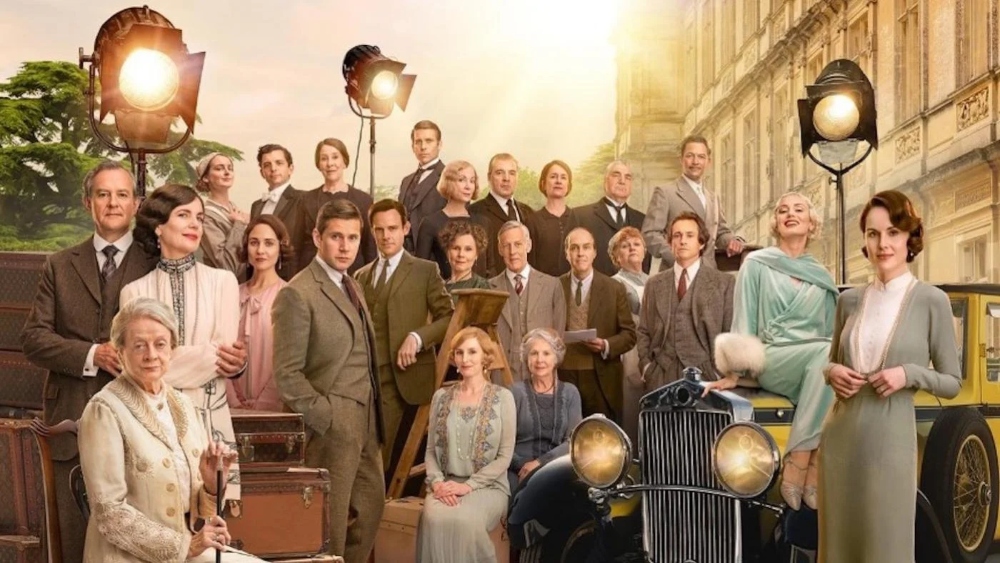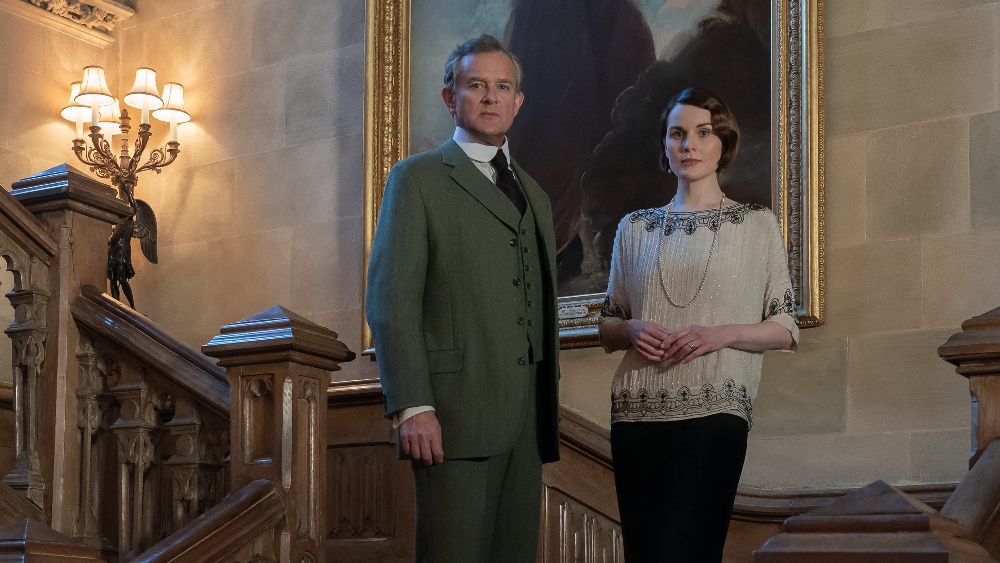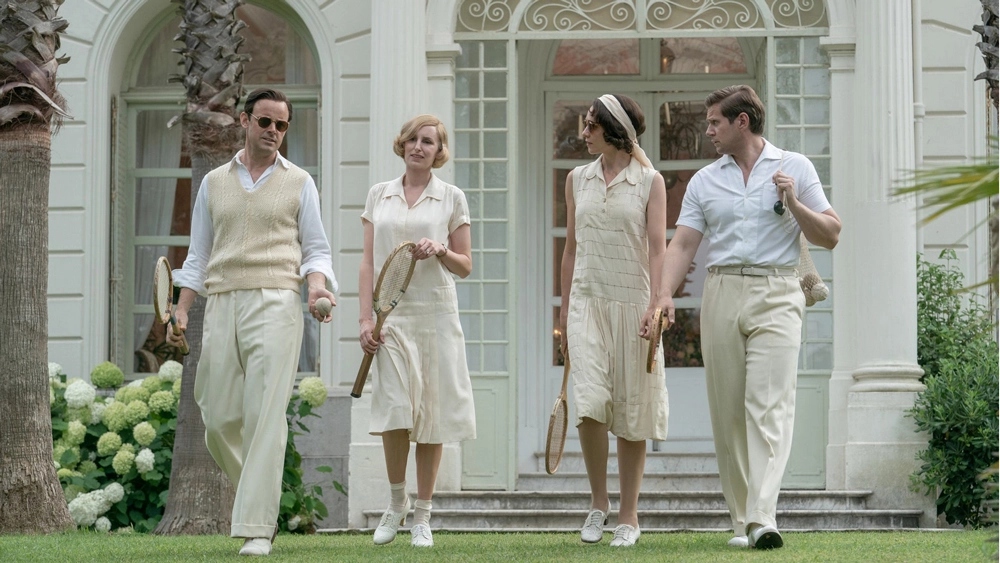
The Crawley family dynasty returns at the turn of another decade (the beginning of the 1930s) in the historical dramedy Downton Abbey: A New Era. The period referred to in the title is a very specific one — the moment in which the motion picture industry switched from silent movies to “talkies,” came with many consequences, some expected, others unforeseen. The title may also refer, more subtly, to the changing of the guards within the Crawley family itself, as some of the older barons fade in importance or into history altogether, and granddaughter Lady Mary (Michelle Dockery) exerts more control over the estate. Whatever its focus, the sequel is as pulpy, soap opera-y, and entertaining as the TV series and the 2019 film that brought these well-known characters to the big screen, and it should please both casual and devoted fans alike.
When A New Era opens, the Crawley family receives a big piece of news courtesy of none other than the Dowager Countess of Grantham (Maggie Smith, as spicy as ever). The Countess has inherited a small villa in the South of France, courtesy of a flame from more than 60 years ago. Too old to travel, and wishing to avoid the very un-Victorian-like, barrister-filled quarrels that come with inheriting a chattel of land from a widower with a family, the Countess sends her family to explore the property in her stead. That includes her son Robert, the 7th Earl of Grantham (Hugh Bonneville), his wife Cora (Elizabeth McGovern), and a group of nieces and nephews eager to spend some time in the sun.

Though Downton Abbey was traditionally cleaved between the story of the “upstairs” patrons and the “downstairs” servants, the division in this film is actually between those who go to France, and the family and staff members who stay behind. In need of cash to secure repairs to the sprawling estate, Lady Mary accepts the entreaties of a Hollywood studio that wishes to film on location — something that was rather new and exciting in the late 1920s. With the group comes thoughtful director Jack Barber (Hugh Dancy), flamboyant star Guy Dexter (Dominic West), and beautiful but shrill-sounding silent-era actress Myrna Dalgleish (Laura Haddock). There are romantic relationships aplenty, obviously, including for the family’s main butler, Thomas Barrow (Robert James-Collier), and, of course, Lady Mary herself.
But, it would take the rest of this review, plus a sequel, to list out the entirety of the cast that makes up this somewhat convoluted ensemble, most of which will be familiar to fans of the TV series or the first film. Mercifully, strict familiarity with their prior stories is not required, and this film is essentially an extra-long version of a standalone TV episode. Suffice it to say that the usual themes of the Downton series are explored, including Victorian stuffiness, long-lost family ties, money troubles, secret scandals, and relationships between the servants. It is an entirely harmless, staid, almost neutered conceit, one that is as unthreatening as a docile Labrador at English tea time. The biggest bars come courtesy of the Dowager Countess, who is sadly underused (as is most everyone) given the number of characters for whom Julian Fellowes’ screenplay must make time. In some ways, though, A New Era is even better than its predecessor thanks to Director Simon Curtis’ crisp editorial style (aided by Adam Recht’s editing), which projects “British” in both its efficiency and its impressive ability to make you feel as if each character had a full story play out in the runtime and got a fair shake.
At the same time, even though the director is new (Michael Engler directed the first film), most of the principal crew is not. Costume Designer Anna Mary Scott Robbins, who has dressed these endearing characters for more than a decade now, returns with her usual turn of the Century gowns but adds several flares of modernity to reflect the changing landscapes — the Hollywood stars, the French Riviera, and the close of the Gilded Decade. Donald Woods, who collaborated with Curtis on My Week With Marilyn and is well acquainted with the Downton estate from his past work on the series, also returns here to add a new layer in the sort of “meta” portrayal of a film being shot on another film’s set. Meanwhile, John Lunn‘s score is, as usual, pitch-perfect to convey the romanticism of the time.

Most impressive, though, is that Downton Abbey: A New Era manages to explore the by-now-cliched stresses that Hollywood faced during the transition from silent films to talkies in a way that feels anything but trite. The new characters’ anxiety — all three the product of a different time in Hollywood — mirrors the Crawley family’s own trepidation about the changing times, the passing of the guard, and what the future will bring. And this theme is timely, given the current turmoil within the movie industry, from the rise of streaming services and Peak TV to the further decline of movie theaters stemming from the COVID-19 pandemic. The theme is neither novel nor, at this point, inherently interesting, since it has been done so many times of late, but if Downton Abbey has always had even just a single artistic talent, it is to make the mundane seem so important. It’s a show that made us care about a group of seemingly overprivileged people and never ceased to turn something familiar into something compelling. The entire film may run like a very long soap opera episode, but that is a feature, not a bug, one that makes it more exciting than a movie about British aristocracy has any right to be.
Things change, even for old-school English society. New generations come along, the older generation passes down their wisdom and memories, and that is the sad yet ultimately happy circle of life within which Downton Abbey is content to exist. A surprising allegory for the industry itself, this new film doesn’t just give you the saccharine (though there is no shortage of that), it also gives you “the facts” and lets you decide how to deal with the emotional fallout of the truth on your own — naturally, in a quintessentially British manner.
Grade: B
Focus Features will release Downton Abbey: A New Era exclusively in theaters on May 18.





